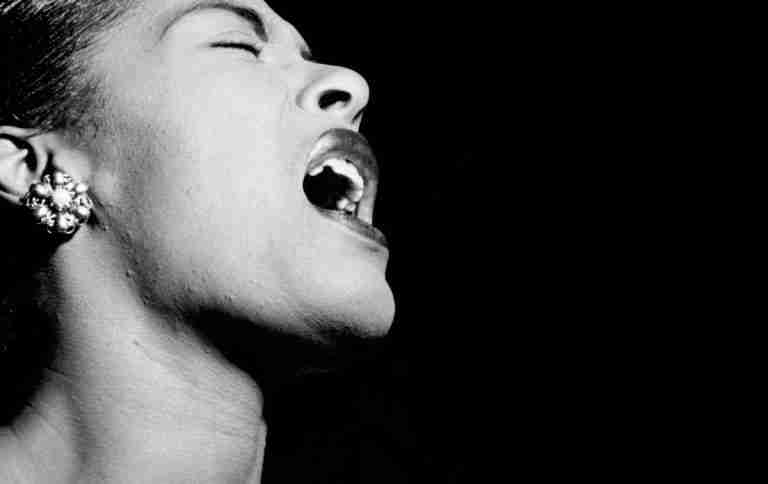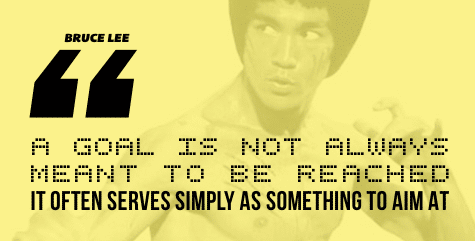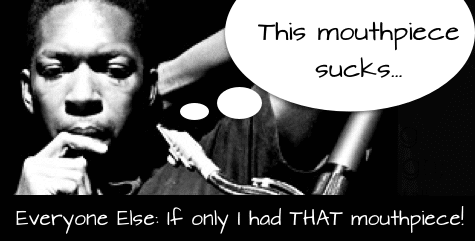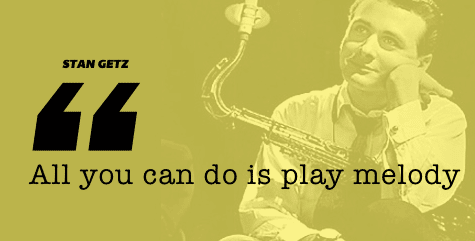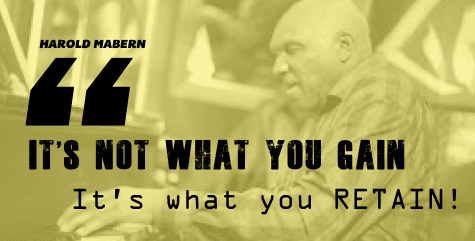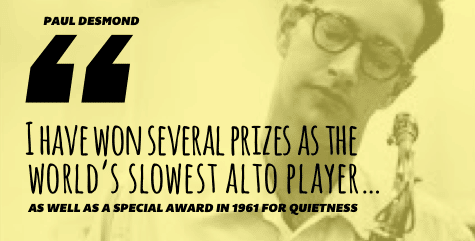Believe me. I know how frustrating jazz improvisation can be. There have been many periods where I’ve wanted to quit for good. Never play again. Times when I’ve seriously considered putting my horn on Ebay, no reserve, shipping it off to an international buyer, somewhere far far away, and hanging it up for good…
But I’ll never do it. Why? Because once you’re bit by the bug, there’s no going back. I’m a musician, just like you. And whether we like it or not, we always will be. Whether we don’t practice for a month or a year, whether we get rid of our instrument or try to move on, we’ll still feel that need. That desire…
That overwhelming desire to create. To take one step closer to musical freedom. It’s addicting, even if it’s so incredibly frustrating.
Accept the reality of being a jazz improviser
The frustration is inevitable. I wish I could tell you it gets better the more you learn and improve, but I can’t. In fact, it only gets worse. The better you get, the higher your aims, and the more critical you become.
If you think you’re frustrated now, just wait until a tiny wrong articulation makes your blood boil, or until you start obsessing over recording yourself. That’s when it really gets bad, putting yourself under a microscope every single day.
So, it’s time right now to learn how to handle it.
You’re never going to play perfectly, you will always make mistakes when you improvise, and no matter how good you get, you’ll want to be better.
But you can think of all of this as a positive thing.
Like Bruce Lee stressed, we’re all striving for perfect, but it’s not actually attainable. It’s the direction toward it that matters.
You’ll always have something new and exciting to work on and if you stay focused, you’ll make continuous improvement your entire life. That’s right, you have your entire life to play music.
It’s not like baseball where your arm goes, or skiing where your knees start to hurt. You have your entire life to derive challenge and enjoyment from this activity.
So now that you’ve reframed your frustration, let’s look into it a little more deeply…
The three types of frustration with jazz improvisation
Now you know that you’ll be frustrated, but you’re not running for the hills because you know how to think about it in a positive light. Instead of bringing you down, it actually encourages you.
But, it’s not quite that simple.
Not all frustration is created equal. Some frustration can cause weeks, months, or even years of hindered progress: when frustration affects your outcome is when it’s serious, and it’s exactly what we want to avoid.
There are three primary types of frustration in jazz improvisation —let’s be honest, there are probably hundreds more, but these are the three that really stand out.
Type #1 – A very specific frustration having to do with the actual music i.e. I can’t play this fast run, I can’t use that harmonic technique, I don’t understand this chord…
Type #2 – A very general frustration having to do with the actual music i.e. I can’t play this tune, I can’t hear intervals, I play the same thing over and over again.
Type #3 – A frustration having to do with something non-music related i.e. my reed sucks, I get nervous when I play with others…
You will inevitably get frustrated in your endless pursuit playing jazz, but you don’t have to get caught in one of the many traps that will cause perpetual frustration, wasting your time and killing your enjoyment.
Getting to the root of the frustration
All types of frustration can cause traps that cost you valuable practice time and hinder your musical growth, but if you can figure out what type of frustration you’re dealing with, you’re one step closer to progressing past it.
To get to the root of the frustration, first identify what type of frustration it is by asking yourself these three questions:
1. Is it specific and having to do with the actual music?
2. Is it general and having to do with the actual music?
3. Is it non-music related?
The answers to these questions will help you figure out the next thing you need to determine:
What do I need to STOP doing right now to end my frustration?
All the frustration you’re experiencing is coming from something you’re doing. Let that soak in for a minute…
The tune very well may be difficult, or the mouthpiece actually may suck, but your frustration and lack of musical growth is coming from what you’re actually doing.
For example, perhaps I’m playing a piece of language and I just can’t seem to get it right in the high register. I’m practicing it over and over, and just getting more frustrated. Well, this frustration has to do with something very specific and music related: Type #1.
With Type #1 frustrations, you need to stop practicing in a fast, sloppy, and hurried way.
Instead, you need to slow down, use a metronome, and drill the problem until it’s solved. Take down the metronome all the way until you can play it perfectly, then, gradually increase it as you gain facility.
In many ways, Type #1 frustrations are the easiest to deal with because the solution is the most direct: slow down, use a metronome and repeat the difficulty until it becomes easy.
Let’s look at another example of a different type of frustration. Donna Lee is a pretty tough tune. Supposing you’re practicing it over and over, but just not getting it down, what could you be doing wrong?
Well, first, what kind of frustration is it? It’s not super specific as it applies to an entire tune, not a tiny phrase of a tune, or one chord, so cross-off Type #1, and it is definitely music related, so we can cross off Type #3.
It’s a general frustration: I’m playing a tune over and over, but not getting it down.
Type #2 frustrations are generally processual, meaning there’s something wrong in your process that’s screwing you up and limiting you from reaching what you’re trying to attain.
So, for Type #2 frustrations you need to find what’s wrong in your process and stop doing it.
If I can’t play Donna Lee, then my approach to practicing a tune has a bug in it. My process doesn’t work and I need to rethink how I approach any tune.
And one final example…if every time I go to practice, I get frustrated by my equipment, like my reed doesn’t play well or I don’t like my mouthpiece, this is a Type #3 frustration: non-music related.
Most of these problems have to do with perception and consistency. We tend to think that a certain piece of equipment or some other non-musical advantage will help us, but it’s not always the case. Although great equipment always helps, much of the time we need to learn to be consistent with what we have and really get to know it.
With these types of frustrations, Type 3, you need to stop looking outside yourself for the answer.
Ok. Now that you have a solid framework for understanding frustration in jazz improvisation, let’s look at some of the specific frustrations and traps that will cause you grief, and how to avoid or get out of them.
The top 10 jazz improvisation frustrations and the 10 things to STOP doing RIGHT NOW to solve them
FRUSTRATION #1
“I play over the same tune over and over, but I’m not getting any better. Help!!”
You need to: STOP soloing over the same tune over and over in the same way.
This is a Type #2 frustration, so your process needs to be altered. Your process is probably something like this:
- Turn on a play-along track
- Improvise until the track ends
- Repeat
- Get frustrated that you’re not improving
With this process, you’re reinforcing bad habits and a singular, and ineffective, approach to a tune. Instead, use the following ideas to upgrade how you practice tunes:
- Loop 4 bars of the tune at a slow tempo in transcribing software instead of attempting to solo over the entire tune.
- Play specific exercises over these four bars until you’ve mastered them. Then move to the next four.
- Apply jazz language to pieces of the tune
- Practice the melody four measures at a time, understanding how each note relates to the chord
- Play the chords at the piano
- Understand the logic and story behind the progression of the tune
These are just a few suggestions on how to alter your process of learning tunes. We have a ton more tune advice you can check out.
The main thing to remember: general frustrations with a tune like this are Type #2 frustrations. Your process needs a significant change.
FRUSTRATION #2
“I can’t find a good “ENTER PIECE OF EQUIPMENT HERE”. One popular example: If only I had a good “mouthpiece” I’d be a great player.
You need to: STOP looking for a magic bullet and instead, get consistent.
This is a Type #3 frustration, non-music related, and if you’re experiencing it, it’s time to stop looking outward, and instead, look inward.
As a saxophonist, this frustration is something I’ve dealt with for years. We all believe that if we had the perfect mouthpiece, that we’d sound like John Coltrane.
Unfortunately, this theory is not true in the least. A mouthpiece with sound dimensions and accurate design helps the player tremendously, and considering that much of the saxophone equipment today is mass produced garbage, it’s worth spending some time finding a setup that corresponds to your tonal and overall playing concept.
The keyword in there is SOME time.
Despite the instrument you play, finding equipment that helps you achieve your playing style does help, but you can easily go down this rat-hole for years.
Find equipment that you like and stick with it for at least a year. Consistency is king.
Doing this will help you progress forward musically rather than thinking you’re progressing forward by changing mouthpieces.
Don’t get me wrong. I’m not saying ignore finding the best equipment for you. There’s a reason all my favorite players play some of the best equipment. It’s no coincidence. But don’t get lost in the search at the expense of your musical development.
FRUSTRATION #3
“I’ve learned all my scales, but I’m not playing anything meaningful. How do you go from playing scales to lyrical phrases?”
You need to: STOP wandering in scales
Frustration with a general improvisational concept is going to be what type of frustration? That’s right, Type #2. Something must be wrong with your process.
When people learn to improvise, they’re often told to play a scale for each chord, mix up the notes, and improvise!
While scales and chordal knowledge are a necessary tool for the improviser, this attitude is a far cry from improvising strong melodic lines.
We need to stop wandering within scales.
If we know all our scales, but aren’t playing phrases that have that singing lyrical quality to them, we need to go back to the drawing board and listen to and transcribe our heroes.
But, transcribing alone will not get you where you want to go. Plenty of people have transcribed many solos without improving much. It’s not only transcribing that moves you in the right direction, it’s what you do with the information you’re transcribing.
No matter what you play as you improvise, even if you play a chordal instrument like piano, you’re still trying to create strong lyrical melodies over the chords.
The key is understanding what it is you’re transcribing in terms of melodic techniques. In other words, what’s the technique that the great player you’re transcribing is using to create a strong melodic line?
Instead of wandering within scales, work on acquiring melodic techniques: real concrete strategies for playing over each chord that you might encounter.
Now, this may seem a bit daunting, and you may feel like you don’t even have a single melodic technique. If you want to jump start your arsenal of melodic techniques and bridge the gap between scales and transcribing our course Melodic Power does just that. If you’re interested in the idea of melodic techniques, the course walks you through in 42 step-by-step lessons, the exact process of implementing melodic techniques over major, minor, dominant, and half diminished chords.
You can start making use of this concept of melodic techniques in your practice and in everything you transcribe right now. Always ask yourself “How can I boil down what this musician is doing into a single melodic technique and how can I best use this technique in my own playing?”
That’s how you actually make use of the information.
Having melodic techniques at your disposal gives you options. No longer will you only have theoretical chord or scale knowledge at your disposal, but you’ll have real techniques you can use and apply in real-time.
FRUSTRATION #4
“I use play-alongs in a productive way, but the vibe of my playing is still not right. How can I get the feeling of jazz in my playing?”
You need to: STOP using play-alongs for everything you do
Practicing with play-alongs can be super fun, but often when you use them for everything you practice, you lose something in your playing. Something special that can’t quite be defined.
This “specialness” exists on the “real” jazz recordings, albums like Kind of Blue, or A Love Supreme, and when you step away from the actual music and instead use a substitute like a play-along, you’re bound to feel the effects.
Now I’m not hating on play-alongs, they’re a useful tool, but I’m sure you’d rather listen to Coltrane on repeat than a play-along. That’s because there’s nothing special about a play-along. By not playing with the music of the greats, you’re missing the opportunity to soak up that special vibe that exists on these records.
Instead of playing with a play-along all the time, try playing along with a real recording instead. Yes, you’ll be playing with and over other instruments but that’s the whole point. To play with them and get the vibe of the recording.
FRUSTRATION #5
“Every weekend I practice all day, but I’m not improving as fast as I want to. What am I doing wrong?”
You need to: STOP practicing all day once a week
This is a frustration with our ability not improving fast enough because of our practice habits, a Type #2 frustration.
The process of how we practice can make or break us as a player.
Instead of practicing only when you have a large chunk of time, dedicate even 20 minutes a day to practicing. Do this EVERY single day.
Focus those 20 minutes and continue to improve upon what you were working on the day before.
It’s always better to practice frequent small amounts than one large session a week. If you can swing it, just have a daily minimum, like 20 minutes.
Say to yourself, “Every day I will practice 20 minutes.” If you have time and end up playing 4 hours, great, but make that promise to yourself to put in your 20 minutes even if you don’t feel like it.
It’s this consistency and daily requirement that will add up to real progress being made.
FRUSTRATION #6
“I have a pretty good ear. I can identify intervals most of the time and can sometimes correctly identify chords, but I can’t use this information when I play. What am I doing wrong?”
You need to: STOP ignoring your ear
Almost anybody who’s studied music a little bit can identify intervals or a chord given the time to think about it.
The problem? Jazz is a REAL-TIME activity, meaning, you have no time to think. Literally zero time.
The aural information you need has to be burned into your brain at a subconscious level. You’re not trying to identify intervals, you’re trying to construct melodies in real-time over harmonic structures.
You can keep playing the “guessing” game with your ear or you can dedicate some time to drilling the fundamentals until you know them inside and out, backwards and forward. Our Ear Training Method has tracks you can take with you on-the-go, or just make another daily commitment to yourself to practice ear training for a simple 5 minutes a day.
If you sat at a piano for 5 minutes a day and did some simple ear training exercises, over a year, you’d see dramatic improvement.
Stop ignoring your ear, and you’ll quickly be able to make use of the aural information you “kind of” know.
FRUSTRATION #7
“I practice four hours a day. I play technical exercises, learn a tune, practice tunes I know, work on jazz language and even transcribe, but I’m not getting better. How’s this possible?”
You need to: STOP trying to learn everything at once
This is clearly a process oriented frustration, but one of the most common, especially if you’re in music school.
Having the time, you may decide to practice all sorts of topics in a given day. The result? You retain very little.
Remember what Harold Mabern says: It’s not what you gain. It’s what you retain.
Instead of tackling 2, 3, or 4 things, try ONE!
I know what you’re thinking. One? That’s easy!
Well, to truly master something and retain it, so you never have to practice it again, is not so easy.
Imagine if you practiced something today and never had to practice it again? That’s what you’re looking for. Sure, you may have to review it again, or jog your memory in the future, but what you’re aiming for is retention, not just practicing to practice.
Spend more time on less. Focus on retention and you’ll see results.
FRUSTRATION #8
“I want to go to a jam session and play really well, but every time I go to one, I just end up getting nervous and playing poorly. What can be done?”
You need to: STOP playing to impress other people
We all want to go to a jam session and kill it. We all practice things that we hope will come out and impress people that are listening, but it just doesn’t happen.
And even if it did, is that really the point?
You should be playing for yourself, because YOU love to play. Not to show off or to impress others.
We all go through this and it’s only natural to want to impress others, sometimes our brain needs to be completely reprogrammed about how we think about music.
Paul Desmond embraced his slow style and became one of the most recognizable and beautiful alto sounds to ever live.
Focusing on impressing others with your musical ability will always leave you frustrated. Don’t be swayed by the popular players of today or your musical peers. Instead, focus on your own sound, concept, and unique perspective.
FRUSTRATION #9
“I practice jazz language constantly and can even use it when I solo, but my improvised lines sound shaky and weak, they’re not definitive the way my heroes sound. Why is this?”
You need to: STOP practicing without a metronome.
Time in jazz is the most difficult thing to teach.
Many jazz educators have their take on it, their abstraction, but it’s still an approximation of what you hear on the recordings.
But, if you’re already playing and listening intently to the jazz recordings you love, then “time-feel” is not really the problem. It’s more technical.
It’s the feeling of time in music.
We all ignore using a metronome, but it’s by far the fastest way to develop an inner sense of beat and time. Make it a habit to practice all your transcribed lines and tunes with the metronome on 2 and 4. I use this one exclusively and love it.
Even one practice session using this tactic will dramatically improve the time-quality of your lines. They won’t have that shaky feeling, instead they’ll lock-in.
If you’re frustrated with your time, start using a metronome in every practice session.
FRUSTRATION #10
“I know all my chords and scales, a bunch of tunes, and I’ve transcribed. When I buy a jazz book or course, I know most of the information in it. Why can I still not play that well?”
You need to: STOP fooling yourself
It’s quite easy to believe your own lies and it’s only human.
But with jazz improvisation, it’s more than that. If you’re playing this music, then chances are you’re a pretty intelligent human being. In my experience, something about this music attracts bright people, so pat yourself on the back.
But here’s where your own smarts start to get you in trouble…
As Charlotte Joko Beck mentions in her excellent book Nothing Special, sometimes our intellectual self actually makes things worse. How can this be the case?
In this situation, where you’re frustrated because you believe you know all the information coming at you and that you’ve gone through the necessary steps, you’re dealing with the fact that you know things intellectually.
In terms of jazz improvisation, what does it mean to “know” something?
It means you can use the information, in real-time, without thinking about it.
It does not mean that you can explain the concept to someone over dinner.
These are two very different understandings of what it means to know something. The problem is, many people, including myself, fall into this jazz improvisation trap because they can talk about something and even think through it given the time.
The only information that helps you in jazz is the information you can use without thinking. Period.
We emphasize the idea of drilling anything you’re trying to learn over and over in all of our courses and many of our articles because it’s the most glossed-over piece of the puzzle.
Instead of thinking you know something, be honest with yourself.
We all have a ton to work on, we all need to know the basics and the fundamentals better, there’s always a higher level to achieve…
Turn your jazz improvisation frustration into practice motivation
By now you should have a pretty good idea of how to get unstuck and rid yourself of the common frustrations you encounter in jazz improvisation.
If you haven’t already, you’re bound to come face-to-face with each of these frustrations in various forms along your journey.
Use the tools you now have to identify the root of the frustration, classify it, figure out what action you need to stop doing, and what you need to start doing instead.
With these simple steps, you’ll take inevitable frustration and turn it into unstoppable practice motivation.
